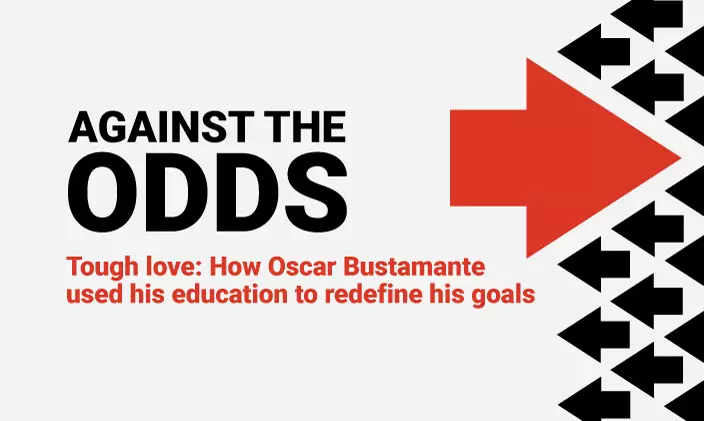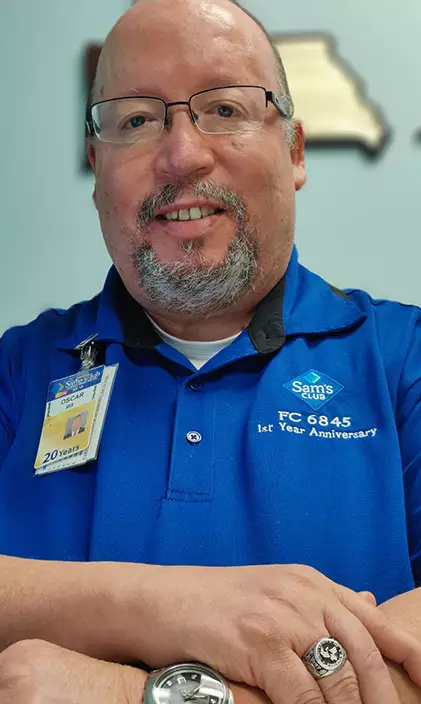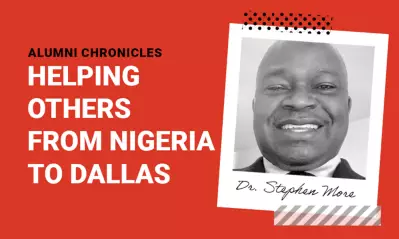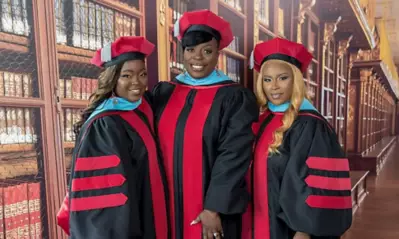Tough love: How Oscar Bustamante used his education to redefine his goals

Written by Elizabeth Exline

“I remember my dad always said, ‘You need to get a degree. Just get a degree.’”
Oscar Bustamante recalls this piece of advice while reflecting on his own bumpy road to earning his bachelor’s degree in business management . Bustamante’s dad had argued that a degree was necessary for intelligently conversing with others and contributing to society, never mind achieving one’s career goals.
But at the time, a callow Bustamante was skeptical. What good was a math degree, he asked, or knowing esoteric facts?
He sees now that he was missing the point.
The good news? Life has a way of presenting challenges over and over until you master the lesson you need to learn. For Bustamante, it turned out that getting his degree was not only his destiny but also a challenge that would bring him closer to his father.
His dad, Bustamante says, explained that a degree meant “‘you’re educated enough to throw your two cents in. You don’t have to know the formulas of science, but you can, when they start talking about pi and X+Y, know what that means.’”
Early education
Bustamante moved around a lot as a kid thanks to his dad’s military career. But by the ’70s, his family had put down roots in Texas where Bustamante started middle school. According to him, his sister was the princess who could do no wrong while he was the proverbial black sheep for whom sports held more allure than schoolwork. When he pictured his future, he says, he pictured a career in baseball or basketball.
Bustamante’s parents eventually divorced. His dad went back to school to earn a business degree and then got a job with the Immigration and Naturalization Service. Bustamante says that’s when the push for him to go to college really started. His dad eventually offered to pay for college on the condition that Bustamante kept up his grades.

“So I went to school, and the first thing I heard was that you don’t have to come to class if you don’t want to come to class,” Bustamante says.
He’s not the first college student to hear those words and promptly fail out of his first semester. But his father wasn’t joking.
“My father said, ‘You know, I’m sorry, but I’m not going to pay for your school anymore. You have to learn the hard way,’” Bustamante says.
The hard way meant getting by on odd jobs and minimum wage which, in 1976, was $2.30 an hour. Eventually, Bustamante took a job as a delivery driver. The pay was good, and his responsibilities were few, but when his father had a heart attack, his life changed again.
“I went to see him on what we thought was his deathbed … and he said, ‘Son, I need for you to graduate. I need you to go to school. I can’t die unless I know that you are OK,’” Bustamante recalls.
Growing up
Bustamante made the promise, but once again, life got in the way. His employer wouldn’t support his return to school, so he quit and took a job as a substitute teacher. He got married and helped raise his stepchild, appreciating the flexibility substitute teaching offered.
Then, in 1995, Bustamante’s family welcomed the arrival of his newborn son. And suddenly (to borrow the parlance of the millennials) he adulted.
“Up until that point, I wasn’t really responsible,” Bustamante says. “I was married … I gave her all the love I could, but I always thought, You know, if this doesn’t work, I can leave. … But when I had Tony, that’s when I fell in love … and I said, ‘I need to do something for this child.’ That’s when I decided to go back to school. It wasn’t about me anymore.”
A step back
There was another, less poetic reason to contemplate getting that degree: money. As it turned out, substitute teaching didn’t cover the bills, and neither did his wife’s income as a legal secretary.
“My wife was the financial brains of the family,” Bustamante recalls, “and she was noticing that we were losing track of where we were. That’s when she brought up government assistance, and I was just too proud to do it for a while. Then, when the bills started taking over and we almost lost the car, it was time to [get help].”
This was not easy for Bustamante, who’s a pick-yourself-up-by-your-bootstraps sort of guy. He wasn’t coddled as a child and grew up during a time when corporal punishment was still allowed in school. In sports, he recalls, defeat was unacceptable.
“So, when the government assistance came around, I just thought, I need to get off of this as quick as I can,” Bustamante says. “And the only way I was going to do that was to get an education.”
Second time's a charm
Around this time, Bustamante saw an ad for University of Phoenix (UOPX). Traditional university programs, however, required a four-year investment of time Bustamante didn’t have.
UOPX, on the other hand, was designed for adult learners . It offered the education of a traditional, four-year university but with the timeline of a community college and the flexibility of nighttime classes not offered anywhere else.
“Of course,” Bustamante adds, “[UOPX] couldn’t promise me [a specific salary] after graduation, but I knew anything was better than the amount of money I was making at the time. So, I signed up and hoped for the best.”
It wasn’t easy, of course. Bustamante drove 50 miles round trip from the outskirts of Texas to the New Mexico campus to attend classes. Sometimes, when a snowstorm hit, he’d spend the night in a hotel.
But school brought some distinct advantages too. Bustamante recognized emerging leadership skills that, combined with his background in teaching, would shape his career after college. It also brought him closer to his dad.
“I’m proud to say that my father was able to see me graduate before he died,” Bustamante says.
Bustamante’s business degree also brought opportunity. After graduating, he secured a job with Walmart, Inc. as a Loss Prevention Operations manager, a role for which a degree was preferred. “As a substitute teacher, I was making $16,000 a year,” Bustamante recalls. “[Walmart] offered me $39,000 a year.”
It also offered him stability and the chance to build a real career spanning two decades, multiple moves and a series of promotions that resulted in the financial security he needed for his family.
As for government assistance? Now that episode of his life has become a teaching moment. “When I sit down with an associate, and I tell them that story … they look at me, and they’re truly surprised to know that I was on food stamps and how low my family and I were.”
Bustamante doesn’t miss a beat. Using their surprise to drive home his point, he follows up with, “I tell them that I wasn’t going to get out of that unless I got an education.”
A return to his roots
In a way, Bustamante has come full circle. Today, he is the environmental, health and safety operation manager for Walmart, Inc. Like his father, he encourages the next generation to pursue higher education. (Especially when tuition benefits are available.)
His leadership and teaching skills have made him a resource for his company. He says he still gets calls from colleagues who want his guidance on how to resolve certain challenges. And, as he contemplates retiring in 2022, he is considering teaching again.
“I’ve been doing this for 23 years,” Bustamante says. “So, I think I would bring valuable experience to teaching [at the college level].”
In the end, Bustamante’s leap of faith has yielded far more than just financial stability. It has given him skills and confidence. It has given him breadth of knowledge. Most importantly, it gave him a stronger relationship with his father.
“When [my dad] came to visit me one year, he had already had his quadruple bypass,” Bustamante says. “He was saying, ‘Son, it’s time for me to go. … You got a family, you got kids. I did my job. … I’m very happy with what I did with you guys.’ And the very next day, he died.”
From all of this, Bustamante draws one final lesson. Wearing his UOPX ring and a smile, he observes, “Believe in the goal, and you shall achieve it.”

ABOUT THE AUTHOR
Elizabeth Exline has been telling stories ever since she won a writing contest in third grade. She's covered design and architecture, travel, lifestyle content and a host of other topics for national, regional, local and brand publications. Additionally, she's worked in content development for Marriott International and manuscript development for a variety of authors.
This article has been vetted by University of Phoenix's editorial advisory committee.
Read more about our editorial process.
Read more articles like this:


